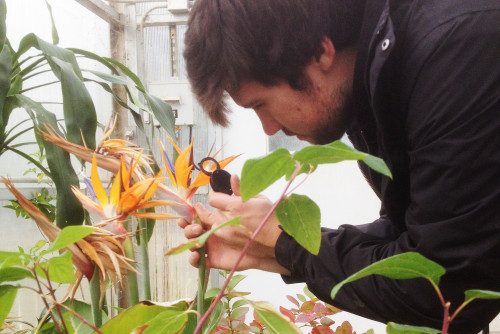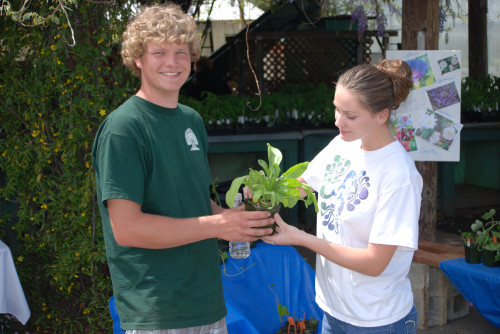Agriculture: Pest Control Advisor Preparation Certificate
Certificate | SC Program: CT.3450
Pest Control Advisors (PCAs) are licensed professional production consultants who serve California agriculture, natural resource and horticulture producers. PCAs specialize in pest management, but they are also an important resource to producers in a wide range of production concerns related to plant health. This certificate satisfies the core-course requirements specified for option “3.b” in preparing to take the Pest Control Advisor’s exam with the California Department of Pesticide Regulation. The following courses need to be completed with a 2.0 grade point average or better. Note: In addition to completing the course work, the Department of Pesticide Regulation requires PCA exam applicants to have completed 24 months of technical work experience before taking the exam.
This certificate is approved through the California Community College Chancellor’s Office. Upon satisfactory completion of the listed requirements and filing an application for graduation with Admissions and Records, the student’s transcript will reflect completion of this certificate.



Choose your path
Map your education by viewing the program map for the degree or certificate you’re interested in earning below. Meet with a counselor to create your official comprehensive education plan.
A program map shows all the required and recommended courses you need to graduate and a suggested order in which you should take them. The suggested sequence of courses is based on enrollment and includes all major and general education courses required for the degree.
Fall Semester, First Year
14 Units TotalThis course is an introduction to the major concepts of modern biology. Topics covered include biochemistry, cell biology, heredity, and nature of genes, evolution, diversity of life, and principles of ecology. Emphasis will be placed on those aspects of biology that are rapidly reshaping our culture. This course may be offered in a distance education format. This course will meet the general education requirement for a laboratory science if taken with BIOL 10L.
This course is a survey of inorganic chemistry and some organic chemistry suitable for agriculture and nursing students. The basic fundamentals of the metric system, chemical nomenclature, atomic and molecular structure, chemical reactions, energy changes, states of matter, solutions, chemical equilibria and kinetics, and organic functional groups are presented. The quantitative nature of chemistry is developed by introduction of the Avogadro's number and the mole and continuing with stoichiometry, gas law, solution concentrations and pH calculations. The lecture/discussion portion of this course may be offered in a distance education format.
Spring Semester, First Year
13 Units TotalThis is a required course for Environmental Horticulture majors. The installation of lawns, groundcovers, shrubs and trees will be covered. The practices of pruning, trimming, mowing, watering, fertilizing, and pesticide application as applied to landscape management of home, parks, highways, and how to estimate and bid in all areas of landscape management will also be covered. This course may be offered in a distance education format.
This course offers an introduction to the biological principles of plant growth and development. Ecosystem relationships will be covered with particular emphasis on succession, water cycle, mineral cycle, and energy flow. In addition to investigating modern production and marketing practices of agronomic crops, the impact of commercial crop production upon mankind and the environment will be considered. The lecture portion of this course may be offered in a distance education format.
Fall Semester, Second Year
15 Units TotalThis is a study of water hydraulics, irrigation systems design, and installation procedures and irrigation scheduling. Techniques in the operation and maintenance of irrigation systems will also be presented. Emphasis will be placed on residential design and installation, but commercial design and installation will be covered. This course is required for all Environmental Horticulture majors. The lecture portion of this course may be offered in a distance education format.
This is the training course for the Master Gardener Program, a community service organization designed to relay research-based horticultural information to the home gardener. The Master Gardener program was developed by the University Cooperative Extension to train interested horticultural enthusiasts to assist local gardeners in diagnosing plant problems and to provide science-based information for keeping home landscapes and the environment healthy. The University of California has agreed to let Shasta College use their training materials which are provided through this class. Topics covered in this course include pesticide use, IPM, weed identification and management, pruning, plant diseases, soils, fertilizers, growing vegetables, native plants, vermiculture, watering and many other plant-related topics. This is a required course for anyone interested in obtaining a UC Extension certification as a Shasta College Master Gardener. This course may be offered in a distance education format.
This course will discuss the biotic and abiotic stress factors that influence forest resource values. Direct and indirect management practices, in addition to silvicultural principles that maintain and enhance biotic balance, biological diversity, and ecosystem health and productivity, will be covered. Issues related to fuels management and prescribed fire will also be covered. The lecture portion of this course may be offered in a distance education format.
Note: This class includes two Saturday field trips on classification, judging, and conservation of soils. The class is required for all agriculture, natural resources, and horticulture majors.
This class is an introductory course on the physical, chemical, and biological properties of soil as it relates to agriculture and natural resources. Ecosystem relationship of soil use and management is emphasized. The effects of drainage, tillage, and irrigation on land use are discussed. A portion of this course may be offered in a distance education format.
Please see a counselor to discuss options for meeting general education requirements for transfer to California State Universities (CSU) and/or University of California (UC) campuses, as well as any specific additional courses that may be required by your chosen institution of transfer.
*Alternative Courses: Please see a Shasta College counselor for alternative course options. You can also view the following to find other courses to meet degree/certificate requirements:
- California State Universities – General Education
- IGETC – Intersegmental General Education Transfer Curriculum
Need a print out? Feel free to download and/or print out a copy of the sample program map(s).
Contact Us for More Information
Counseling & Student Services
Contact InfoAcademic/Instructional Division Office
Shasta College Horticulture: Pest Management
 Play
Play
Horticulture and Plant Science instructor Leimone Waite talks to us about integrated pest management.
Start Your Future at Shasta College
We are dedicated to helping you reach your educational and career goals. To begin your journey, apply for admissions today!
